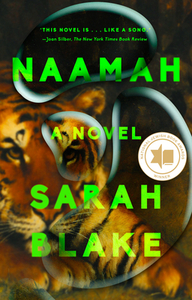Take a photo of a barcode or cover
This book was so unique and imaginative. I loved Sarah Blake's take on what Naamah would be going through and struggling with in the aftermath of the flood. Her writing is so beautiful and compelling that I was immediately immersed in the story. Absolutely loved this and recommend it to everyone!
Thank you to Riverhead Books for providing a free advanced copy in exchange for my honest review.
Thank you to Riverhead Books for providing a free advanced copy in exchange for my honest review.
I read it in like 12 hours, but it was weird. I didn't really understand the dream metaphors. It was all magic and no substance. The sex scenes were odd and clinical and as if the author had never seen a penis much less experienced much with one.
dark
emotional
sad
tense
slow-paced
Plot or Character Driven:
Character
hopeful
mysterious
reflective
medium-paced
Plot or Character Driven:
Character
Strong character development:
Yes
Loveable characters:
Complicated
Diverse cast of characters:
N/A
Flaws of characters a main focus:
Yes
Wow! This book was so beautifully written that obits own the story would have been non-sensical but Sarah Blake drew me in and I couldn’t put it down.
challenging
emotional
reflective
slow-paced
Plot or Character Driven:
Character
Strong character development:
Complicated
Loveable characters:
Complicated
Diverse cast of characters:
No
Flaws of characters a main focus:
No
2 1/2 stars. It was ok, and I kinda-sorta liked it.
Naamah is a retelling of the Hebrew flood myth from Noah’s wife’s point of view, but once the earth is flooded there’s not much telling left to do. With the world destroyed, and Noah’s family and the animals two by two out at sea, the myth becomes more of a domestic drama, with heavy strains of dream play, and magical realism. It’s an interesting book, but it’s not that good, and I think the problem lies with the author trying to do too much within the confines of one story. The book is a collage of myth, domestic drama, feminist theory, theodicy. psychology, and argument with God, and his heavenly and earthly creatures.
Scripture is notoriously short on detail, and character development. Stories tend to move with lightening speed, and in this case, an ark is built, provisioned, laden and staffed, a world is destroyed, an epic voyage completed, laws given, and a world re-imagined in seventy some verses (sentences, really.) That’s some pretty compact story telling. So, Sarah Blake found a vehicle that could carry some expansion.
The job of a retelling is to bring new information and to illuminate the original story. The domestic drama gives that to us. Naamah, upon whom everything hinges rules the roost. She knows how to tend and psychoanalyze the animals (humans included,) whether or not she can see them, has botany skills, can do basic carpentry, effect cures for all that ails anyone on board – animal , vegetable, or mineral, all while maintaining an active erotic life with memories, an angel, a daughter-in-law, and once with a sun-warmed stone. Really, more than I needed to know, though once taught I could see the cleverness of a mineral dildo. Naamah, of course, had three children with Noah (500 years old according to the good book) so I guess she’s the first poly-amorous character in the bible, although I don’t really know if Noah was in the loop.
Naamah has any number of “imaginary friends,” if that’s what you’d call them. The two most important are an angel that lives underwater and rides herd over a bevy of drowned children, and a talking cockatoo named Jael. I thought the angel and the kids were fascinating, and Naamah’s relationship with them was breathtaking (sorry,) and easily for me the most interesting writing in the book. Jael was a bird too far, and I had a hard time visualizing the creature flip flopping around Naamah’s head dispensing avian insights. Anytime Jael winged in the story took a nose dive (sorry, again.)
The egregious dream-breaker in the book is the author’s choice of using modern English as a simulacrum of whatever language the family/survivors might have spoken. It gave the Ark the feel of the Love Boat.
It’s interesting to note that Noah’s wife is not named in Genesis, but there is a Naamah that exists in the Zohar as Adam’s consort, and mother, with Lilith, of his demonic children – the “Plagues of Mankind.” Naamah’s particular offering to the world is childhood epilepsy. How she would have gotten hooked up with Noah is a good question, but those demons are nothing if not clever. At least one other character from the Zohar shows up, Metatron, another angel of sorts, with the head and neck of a vulture. I can’t imagine Sarah Blake having not plotted these twists out, and it does give texture to the narrative. Again, though, more than the book could really carry.
I stuck with the book, only jumped one endless house-keeping chapter, and random paragraphs in the middle, and was just as happy as anyone when the waters receded.
Sorry, Nammah is a mess, an ambitious one, holding some good, even beautiful writing, and interesting ideas, but I’ll never be able to think about it without working to separate the mess from the good that’s there.
Naamah is a retelling of the Hebrew flood myth from Noah’s wife’s point of view, but once the earth is flooded there’s not much telling left to do. With the world destroyed, and Noah’s family and the animals two by two out at sea, the myth becomes more of a domestic drama, with heavy strains of dream play, and magical realism. It’s an interesting book, but it’s not that good, and I think the problem lies with the author trying to do too much within the confines of one story. The book is a collage of myth, domestic drama, feminist theory, theodicy. psychology, and argument with God, and his heavenly and earthly creatures.
Scripture is notoriously short on detail, and character development. Stories tend to move with lightening speed, and in this case, an ark is built, provisioned, laden and staffed, a world is destroyed, an epic voyage completed, laws given, and a world re-imagined in seventy some verses (sentences, really.) That’s some pretty compact story telling. So, Sarah Blake found a vehicle that could carry some expansion.
The job of a retelling is to bring new information and to illuminate the original story. The domestic drama gives that to us. Naamah, upon whom everything hinges rules the roost. She knows how to tend and psychoanalyze the animals (humans included,) whether or not she can see them, has botany skills, can do basic carpentry, effect cures for all that ails anyone on board – animal , vegetable, or mineral, all while maintaining an active erotic life with memories, an angel, a daughter-in-law, and once with a sun-warmed stone. Really, more than I needed to know, though once taught I could see the cleverness of a mineral dildo. Naamah, of course, had three children with Noah (500 years old according to the good book) so I guess she’s the first poly-amorous character in the bible, although I don’t really know if Noah was in the loop.
Naamah has any number of “imaginary friends,” if that’s what you’d call them. The two most important are an angel that lives underwater and rides herd over a bevy of drowned children, and a talking cockatoo named Jael. I thought the angel and the kids were fascinating, and Naamah’s relationship with them was breathtaking (sorry,) and easily for me the most interesting writing in the book. Jael was a bird too far, and I had a hard time visualizing the creature flip flopping around Naamah’s head dispensing avian insights. Anytime Jael winged in the story took a nose dive (sorry, again.)
The egregious dream-breaker in the book is the author’s choice of using modern English as a simulacrum of whatever language the family/survivors might have spoken. It gave the Ark the feel of the Love Boat.
It’s interesting to note that Noah’s wife is not named in Genesis, but there is a Naamah that exists in the Zohar as Adam’s consort, and mother, with Lilith, of his demonic children – the “Plagues of Mankind.” Naamah’s particular offering to the world is childhood epilepsy. How she would have gotten hooked up with Noah is a good question, but those demons are nothing if not clever. At least one other character from the Zohar shows up, Metatron, another angel of sorts, with the head and neck of a vulture. I can’t imagine Sarah Blake having not plotted these twists out, and it does give texture to the narrative. Again, though, more than the book could really carry.
I stuck with the book, only jumped one endless house-keeping chapter, and random paragraphs in the middle, and was just as happy as anyone when the waters receded.
Sorry, Nammah is a mess, an ambitious one, holding some good, even beautiful writing, and interesting ideas, but I’ll never be able to think about it without working to separate the mess from the good that’s there.
A little far fetched for my taste and the writing was not terribly interesting.







